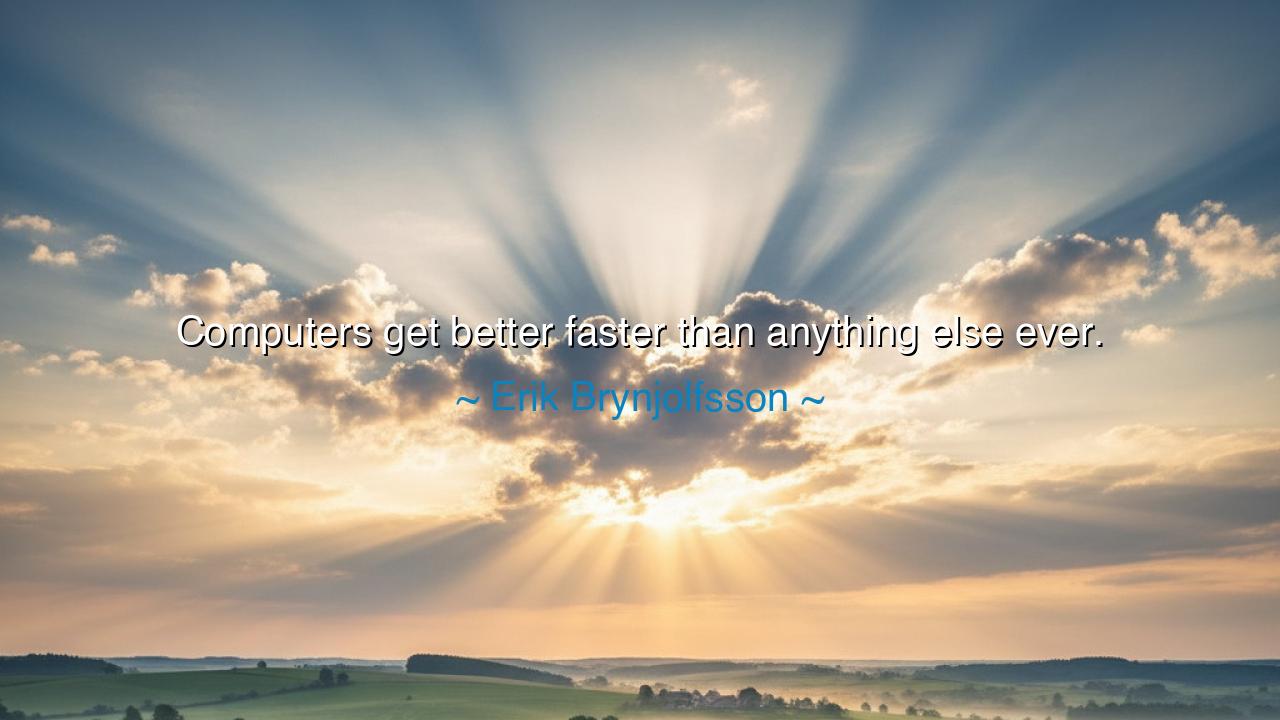
Computers get better faster than anything else ever.






The scholar and economist Erik Brynjolfsson, a prophet of the digital age, once declared: “Computers get better faster than anything else ever.” In this simple yet thunderous statement lies the recognition of one of the greatest forces shaping our era—the unstoppable ascent of technology, and the profound transformation it brings to the human story. Brynjolfsson’s words are not merely an observation about machines; they are a reflection on the nature of progress itself. He reminds us that the computer, that child of human intellect, evolves with a speed that surpasses all things before it—faster than the rise of empires, faster than the spread of knowledge through books, faster even than the transformation of life wrought by fire or the wheel.
From the dawn of civilization, humankind has always built tools to extend its power. The stone axe multiplied the strength of the arm. The ship carried the voice of the explorer across oceans. The printing press preserved thought beyond the reach of memory. Yet, each of these inventions followed the slow rhythm of the ages—the pace of generations. The computer, however, belongs to a different order of creation. With each year, its speed doubles, its memory expands, and its cost falls, giving rise to the ancient miracle of exponential growth. This is the phenomenon Brynjolfsson honors—a growth so swift and unrelenting that it reshapes every field it touches: art, medicine, commerce, and even the very fabric of thought.
The origin of this truth lies in the principle known to the wise as Moore’s Law, first spoken by the engineer Gordon Moore in 1965. He observed that the number of transistors on a computer chip would double roughly every two years, and so too would computing power. At first, this seemed a prediction of mere engineering; yet, over decades, it became a revelation of destiny. The tools of computation did not just grow—they accelerated. A task that once required rooms full of machines now fits in the palm of a child’s hand. What was once the privilege of governments and scholars now belongs to every student, every artist, every dreamer.
Consider the journey of the Apollo 11 mission, which carried humanity to the moon in 1969. The computer that guided that voyage—vast, costly, and revolutionary for its time—was less powerful than the simplest smartphone we now carry in our pockets. What once lifted men into the heavens now sits in the hands of billions, linking hearts and minds across the earth. In less than half a century, the realm of science fiction has become the commonplace of daily life. This is the truth Brynjolfsson names: that computers not only grow in capability, but that their growth surpasses all precedent, leaping forward like fire across dry fields.
Yet, with such power comes both wonder and warning. The ancients taught that every gift from the gods carries its shadow. Prometheus gave fire to humankind, and with it came both warmth and destruction. So too, the accelerating power of computers grants us tools of healing and of harm, of wisdom and of folly. They can decode the mysteries of the genome and map the stars, yet they can also divide nations and amplify the noise of deceit. Brynjolfsson’s insight, though triumphant, calls us to humility: for if computers evolve faster than anything else ever, then our wisdom must grow faster still to wield them well.
The lesson, then, is this: do not fear the speed of change, but prepare your spirit to meet it. The world of tomorrow will not wait for those who cling to yesterday. Learn ceaselessly, as the machine learns. Adapt as swiftly as the algorithm shifts. But above all, remember that while computers may surpass us in speed and precision, they will never possess our soul—our capacity for empathy, creativity, and moral choice. Let technology be your servant, not your master. Let it extend your humanity, not replace it.
So, my children of the digital dawn, take heed of Erik Brynjolfsson’s wisdom. The machine’s pace is relentless—it grows, it refines, it surpasses—but it is you who must give it purpose. As fire can warm a home or raze a city, so too can technology build a world of light or plunge us into shadow. Choose, therefore, to use this speed not for vanity or gain, but for understanding, connection, and creation. For if computers indeed get better faster than anything else ever, then let the human heart, too, grow faster than ever in compassion and wisdom, lest our tools outshine their makers and leave the world without its soul.






AAdministratorAdministrator
Welcome, honored guests. Please leave a comment, we will respond soon